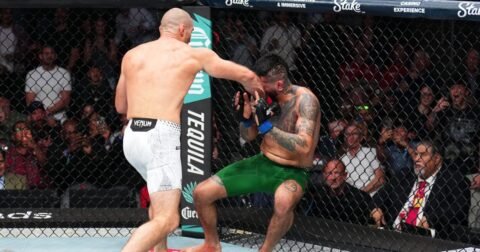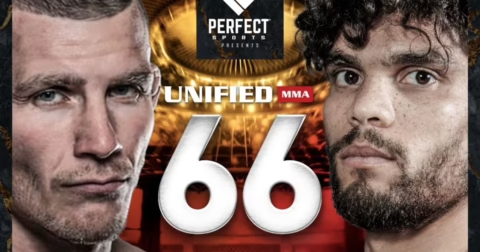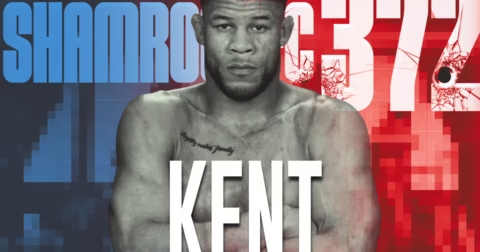In a dramatic turn of events, Jon Jones insists he isn’t responsible for the ongoing turmoil in the UFC’s heavyweight division, despite stirring skepticism from former middleweight champion Michael Bisping. Jones, the heavyweight titleholder for over two years but only a one-time defender, is facing backlash for overshadowing interim champion Tom Aspinall. Bisping’s pointed comments emphasize the significant impact of Jones’s inaction on the division, raising crucial questions about accountability among champions in mixed martial arts.
Jon Jones and the Heavyweight Division Stalemate
Jon Jones, one of the most controversial figures in the UFC, has found himself at the center of a significant impasse in the heavyweight division. Having returned to MMA and secured the heavyweight title over two years ago, Jones has rarely been active in the cage, with only one title defense to his name against Stipe Miocic. This extended inactivity has caused widespread frustration among fighters and fans alike, particularly as the division has been left in limbo without a clear path forward. The UFC’s heavyweight landscape has seen the emergence of potential contenders like Tom Aspinall, yet Jones’s prolonged absence has stifled their chances at challenging for the title.
In a recent appearance on social media, Jones attempted to deflect criticism by asserting that the delays and stagnation in the heavyweight division were not his fault. He cited factors beyond his control, placing the blame squarely on the UFC’s promotional strategies. However, this assertion has not been met with much sympathy, particularly from former champions like Michael Bisping, who voiced his skepticism regarding Jones’s claims.
Michael Bisping’s Critique
Speaking candidly on his YouTube channel, Bisping directly challenged Jones’s narrative. He highlighted that while Jones painted himself as a passive actor in the situation, his actions—or lack thereof—indeed have repercussions across the entire division. Bisping quoted Jones, saying, “I’ve just been playing the role of the company man by doing nothing at all… it’s been incredibly lucrative.” This self-description raises eyebrows, as it underlines Jones’s apparent satisfaction with his financial gains while the fighters below him compete for a chance at the title.
Bisping’s criticism is not unfounded; he posits that by failing to defend his title or vacate it, Jones has indirectly sidelined contenders like Aspinall, who has become the longest-reigning interim champion in UFC history. Bisping emphasized, “It does have everything to do with you, Jon. You are the champion and you’re the one who should fight, who should defend or vacate.” This calls into question the ethics of a champion who does not actively participate in the competitive landscape of their division.
The Case of Tom Aspinall
Tom Aspinall’s rise to the interim title was a noteworthy achievement, marking a significant moment in his career. However, his tenure as the interim champion has been marred by the absence of a unification bout with Jones. With the heavyweight division’s hierarchy unsettled, fighters like Aspinall are left to navigate uncertainty about their future prospects. His time as interim champion has extended over 534 days, eclipsing the previous record held by Renan Barao, yet without a title shot, the significance of this accolade diminishes.
Aspinall has expressed his desire to fight for the undisputed title, arguing that champions should be expected to defend their belts consistently. The current situation not only impacts Aspinall but also resonates with other fighters who are waiting for their shot at glory. The UFC’s hierarchy appears questionable when a champion remains inactive for such an extended period, raising concerns about whether the organization should enforce mandatory defenses more strictly to avoid similar situations in the future.
Looking Towards the Future
As the heavyweight division remains in limbo, the question persists: what’s next for Jon Jones and the title he holds? With each passing day, the urgency for Jones to either defend his title or relinquish it grows. Bisping’s assertions have reignited discussions about fighter responsibility and the implications of prolonged inactivity at the champion level. For fans and fellow fighters, clarity is essential, as the continued delays leave many feeling frustrated and disenchanted.
Ultimately, the future of the heavyweight division hinges on Jon Jones’s next move. Should he choose to fight and defend his title, it would significantly reshape the landscape of UFC’s heavyweight hierarchy and give clarity to rising stars like Tom Aspinall. Conversely, should Jones continue to evade responsibility, the UFC may need to reconsider their policies on title defenses and interim champions to ensure that the integrity of the sport is maintained.
| Key Point | Details |
|---|---|
| Jon Jones’ Heavyweight Title | Captured the heavyweight title over two years ago and defended it once. |
| Defenses Against | Defended against Stipe Miocic; overlooked Tom Aspinall, the interim champion. |
| Michael Bisping’s Commentary | Bisping criticizes Jones for shifting blame and avoiding responsibility. |
| Social Media Rant | Jones claims he doesn’t stall the division and benefits from being champion. |
| Aspinall’s Reign as Interim Champion | Longest reigning interim champion at over 534 days. |
| UFC’s Interest | Jones suggests UFC wants him to remain champion rather than recognizing Aspinall. |
| Lack of Accountability | Jones refuses to take accountability for the delay in fights for the division. |
The ongoing controversy surrounding Jon Jones and the heavyweight division highlights a critical problem: a champion’s responsibility to defend their title. As Tom Aspinall’s reign as interim champion drags on without resolution, fans must ask: will Jones step up, or will the UFC continue to stall?
Frequently Asked Questions
What is Jon Jones’ stance on the crisis in the UFC heavyweight division?
Jon Jones claims he is not responsible for the current crisis in the heavyweight division, suggesting that the delays in fight scheduling are due to the UFC’s decisions, not his own. He insists that he has not been pulling any strings regarding the fighters’ matchups.
How has Michael Bisping reacted to Jon Jones’ claims?
Former middleweight champion Michael Bisping is skeptical of Jon Jones’ claims, arguing that as the reigning champion, Jones has a responsibility to defend his title or vacate it. He believes Jones’ actions are stalling the division and putting the interim champion, Tom Aspinall, at a disadvantage.
What is the significance of Tom Aspinall’s interim championship reign?
Tom Aspinall has become the longest-reigning interim champion in UFC history, surpassing previous records with over a year as interim champ. His prolonged status highlights the impact of Jones’ inactivity on the heavyweight division.
Why hasn’t Jon Jones defended his heavyweight title more frequently?
Since winning the heavyweight title over two years ago, Jon Jones has only defended it once, against Stipe Miocic, largely attributing his inactivity to decisions made by the UFC. This has caused frustration among fans and fighters alike due to the lack of competition in the heavyweight division.
What are the broader implications of Jon Jones’ statements on the UFC heavyweight division?
Jones’ claims have sparked controversy, suggesting that he benefits financially by remaining champion while not actively defending the title. This situation has led to a stalled heavyweight division, causing frustration among fighters and fans waiting for clearer matchups.







